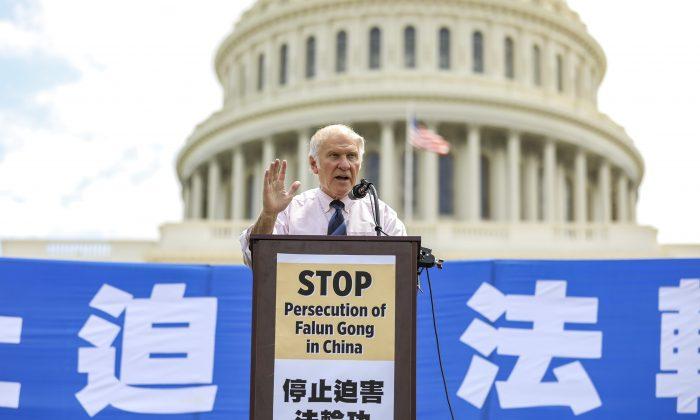Google’s decision to cease self-censorship in China in January and route searches through Hong Kong has altered the competitive landscape for China’s leading search engine, Baidu, which has received a financial boon from investors and is likely to reap an increase in its market share.
While Baidu’s financial good fortune is good news to its investors—including many American investors—the rise of Baidu is a setback to those who are hoping to see China move in the direction of a free and open Internet.
To examine Baidu’s role in China’s Internet, the U.S.-China Economic and Security Review Commission (USCC)—a bipartisan congressional commission—invited two experts on the Internet in China, Rebecca MacKinnon and Rebecca Fannin, to give testimony and answer questions at a hearing held on Capitol Hill on June 30.
USCC Commissioner Jeffrey Fiedler, who cochaired the hearing, stated that representatives from Baidu were invited, but “declined to appear.”
Origins of Baidu
Baidu was started by two Chinese citizens—Robin Li and Eric Xu—who obtained U.S. graduate degrees and owe much to their familiarity with the Silicon Valley culture of entrepreneurship and venture investments, said Rebecca Fannin, author of “Silicon Dragon” and a columnist for Forbes. When Baidu was founded in late 1999, China was on its way to becoming the world’s largest market for Internet and mobile users, which today comprises 384 million online users and nearly 800 million cell phone users, said Fannin.
“Baidu was developed as a Chinese version of Google customized for local users,” said Fannin. Two of Baidu’s five current board of directors are American. Much of the start-up capital is from U.S. investors. Baidu went public on NASDAQ in August 2005. At one point, even Google was an investor in Baidu of $5 million or a 2.6 percent stake. In June 2006, “Google sold its shares in Baidu for more than $60 million and began competing with the Chinese search engine,” said Fannin.
Fannin speaks and writes often on how Baidu was more adept at appealing to the local Chinese market than Google. One key factor among many she mentioned in her column for Forbes is how Baidu’s “search technology was considered superior to Google’s in the Mandarin language.”
Fannin contends that Google’s retreat from China was “primarily a business decision” and not out of idealistic concerns for censoring its customers, which it has been doing since 2006. She argued that Google knew that it would never overtake Baidu, which has 64 percent of the China search market.
At the hearing, Rebecca MacKinnon, a Fellow from Princeton University’s Center for Information Technology Policy, disagreed with her fellow panelist.
“[Google] is not number one [in China], but 35 percent is nontrivial business of 400 million Internet users,” MacKinnon said.
Both Fannin and MacKinnon agreed that Google’s decision to withdraw its Chinese search engine from China has been a boon to Baidu, its stock price has been trading steadily upward and reached a high of $82 in mid-May, more than double the price at the beginning of the year, according to Fannin. First quarter net profits more than doubled to $70 million, she said.
Eager to Please Communist Party
Rebecca MacKinnon, who is also a Senior Fellow of the New America Foundation, said she attended an Internet conference in November in Beijing where:
“CEO Robin Li and 19 other Chinese Internet company executives received the government’s ‘China Internet Self-Discipline Award’ for fostering ‘harmonious and healthy Internet development.’”
“Harmonious” is the term commonly used by the communist regime as the basis for the suppression of free expression. MacKinnon said that the “Self-Discipline Award” is actually China’s annual censorship award for companies.
More evidence of Robin Li’s desire to ingratiate himself with China’s next generation of leaders was provided by a report in the South China Morning Post, cited by MacKinnon. Communist Party Secretary of Chongqing Bo Xilai hosted an event where “Robin Li was one of 24 Internet executives who sang revolutionary songs and pledged to promote ‘red culture,’” MacKinnon said.
“Chinese companies are fully expected to support and reinforce domestic political stability, and to ensure that Internet and communications will not be used in a manner that threatens Communist Party rule,” said McKinnon.
The above policy means that private Internet companies, such as Baidu, “have entire departments of employees whose sole job is to police users and censor content around the clock,” said McKinnon.
All Internet companies operating in China are liable for everything on their search engines, blogging, and social network services. The same liability applies to anything their users discuss through chat clients and messaging services. Private Internet companies—both domestic and foreign—are being incorporated in the regime’s censorship and monitoring program.
If they fail to satisfy the authorities, “they will lose their business license and be forced to shut down,” said MacKinnon.
Aggressive Censorship
While Baidu’s executives won’t publicly divulge the company’s censorship system, MacKinnon described some instances that have leaked out regarding its monitoring and censorship department, which all Chinese Internet companies have. An anonymous Baidu employee leaked documents, which lists the topics and words to be censored. Also revealed were the guidelines for searching for information that the regime orders “to be deleted, blocked, or banned,” said MacKinnon.
Besides the standard keywords related to Falun Gong, Tibetan independence, and the Tiananmen Massacre, the censorship list included: “clashes with the police,” “AIDS,” names of jailed dissidents, and the names of cities where unrest had recently occurred, MacKinnon says.
MacKinnon did her own test in 2008 on Baidu’s blog hosting service. A number of times “I tried to post politically sensitive material such as an article about the parents of students killed on Tiananmen Square, or a recent clash in a remote town in Western China, Baidu’s software would block publication of the post entirely.”
Other posts were held up until a Baidu staffer made a decision as to whether they would be permitted. MacKinnon compared Baidu with other Chinese blog-hosting services, and she found Baidu to be China’s third most aggressive blog censor among the fifteen examined.
At the hearing MacKinnon stressed that the censorship is being conducted by its employees, the software is written by Baidu programmers, and Baidu’s staff is doing the censorship work with the aid of instructions coming from the state regulators. If Baidu doesn’t please the ministries, communist party offices, and state security organs, it may find its annual business license not renewed, or unable to secure licenses needed to expand its business into new products and platforms, said MacKinnon.
When asked whether investors should be told in a prospectus about the risks involved in investing in a company subject to state control, MacKinnon answered in the affirmative: “If I were an investor, I would like to know how much of the company’s overhead is going toward controlling speech of users as opposed to innovation.”
The involvement of Americans and U.S. capital in Baidu was disturbing to Commissioner Patrick A. Malloy. He noted some highly wealthy American investors are putting large sums in Chinese Internet companies, and that “all kinds of people are profiting from the most aggressive censorship system going.” He observed that some people are imprisoned because of this system.
He asked, “Is it acceptable that Americans are underwriting this enterprise [Baidu] and continually profiting from it?”
One answer to Commissioner Mulloy’s question came from Rep. Chris Smith (R-N.J.), who testified earlier in the day:
“U.S. companies and U.S. citizens are involved in the Chinese government’s human rights violations, in denying people their freedom of expression rights, and this can only degrade the standards of American business. ... If we accept these business practices as ‘normal,’ we’ll become desensitized, shrug our shoulders at violations of a basic right—freedom of expression—that has always been a hallmark of who we are as a people.”








